There is high rate of deforestation taking place daily in the rainforest region of the country; trees falling for farming, wood logging and crude oil spillages. The ability of the forest to produce oxygen is being inhibited. The community or people are ignorant of the lasting impacts of the negative activities. They are ignorant about issues of climate change and forest protection and conservation. They are ignorant of the alternative use of the forest resources for income generation.
It appears there are no forest regulations or they are simply not implemented, making easy for a few individuals to economically benefit from indiscriminate cutting down of trees for timber. Government has abandoned its role of regulating the use of forest resources; no enforcement of the rules. There is the need for community awareness on issues of climate change, beneficial use of forest resources, and importance of rainforest to humanity and conservation of rare species of animals.
What this means is that if efforts are not intensified to conserve the biodiversity of the Niger Delta rainforest, the forest and all of its species will be lost in the very near future.
There is a lot of environmental damage that has caused clamour for a break in the use of earth’s resources across the globe. The Niger Delta rainforest is a precious forest that gives mankind oxygen, just like the Amazon rainforest in Brazil. “Africans need to take action on climate change issues and link up with the global community so that our inactions will not derail the global efforts. It is important we know that mankind’s survival in the future depends on the careful use of the environment.
The Niger Delta rainforest needs protection as are other important forests across the globe. This could be done by exposing the issues and proper education of the local people.
It was against this backdrop that the Bayelsa State-born environmentalist, social thinker, entrepreneur and lawyer, Robert Azibaola recently embarked on a 14-day sojourn into the deep rainforest of Bayelsa. Not many people knew what his intension was but had a clear vision of what he was up to achieve.
For him, it was a return home, to showcase to the world, the rich flora and fauna hidden in his home state of Bayelsa. This is the story of an indigene going deep into the depths of the forest, an exploratory voyage, if you would, into the depths of Bayelsa’s rich forest and, through his eyes, we see the impact of human interactions, over the years, on the environment, and how some flora and fauna are endangered as well the huge economic potential lying waste in the Niger Delta.
The journey into the rainforest, by Azibaola and his colleagues at Kakatar and Zeetin Groups, saw the team traverse the deep forest of Bayelsa with so much excitement and gusto, aired on the African Independent Television (AIT) on June 5, 2022. He told the story of his people and the abundant natural resources inherent in not only Bayelsa but also the entire Niger Delta.
Azibaola who was obviously in a familiar terrain, in the process encountered strange fishes such as the snake fish (which is a snake but is actually a fish), reptiles such as Iguanas, rare tortoise, and other animals such as the pangolin which inhabit the forest.
On what he set out to achieve, Azibaola said his aim was to highlight the negative impacts of the use of the Niger Delta rainforest, such as indiscriminate wood logging, environmental pollution as a result of crude oil exploration, indiscriminate hunting and killing of wildlife, cutting down of trees which affects the oxygen levels.
According to him, it is also important to educate the people on issues around depletion of scarce forest resources and the beneficial use of the rainforest for the benefit of future generations. It is also imperative to create an alternative means of livelihood by highlighting the diverse beautiful nature of the Niger Delta rainforest and encourage local and international tourism which will no doubt create jobs for the youth and reduce rate of insecurity in the region.
In the course of his voyage, Azibaola exposed the inherent medicinal plants embedded in the forests which God has blessed man with. To back up action with words, some plants were extracted and their liquid extracts were applied to a section of his entourage. All he wanted to prove was that there is healing in nature and the forests have natural, effective treatment of ailments of all kinds that afflict humans. Importantly, the team discovered in the course of the expedition that Niger Delta rainforest is decimated indiscriminately.
At the end of the day, they had minimum of 25 kilometres to make it by foot to where humans live. They covered over 400 kilometres of fresh waters, continuous tree canopies, swamps, while experiencing the rich biodiversity of the Niger Delta. “Being here is a kind of experience that makes it worthwhile. There is no other pleasure than being in the depth of the forest of the Niger Delta,” he said.
He further said there should be efforts in creating buffer zones for preservation of forest species. Efforts need to be made to reintroduce species that have gone extinct in the forest. There is need for the domestication of trees. These trees are searches that are going extinct that cannot and are not yet domesticated and need to be domesticated in the Niger Delta,” he added.
He called on the government to set up strong regulatory framework for the use of the forest resources. Indiscriminate cutting down of trees, which are the natural habitats of wild species must be checked. Government also needs to reinvent the old age practice of forest guards, akin to forest police, to prevent people from harvesting the forests without government approval. State governments in the Niger Delta must cooperate in this regard.
There should be national frameworks and legislation that will strengthen local institutions. There should be budgetary provisions for an action plan for the Niger Delta rainforest regeneration and conservation. This shall include setting out buffer zones for regulations and enforcement.
There is also the need for linkages between local, national and international institutions and NGOs for the practical conservation of the Niger Delta rainforest so that lessons learnt from elsewhere can be brought to bear in the Niger Delta so that the people of the Niger Delta can as well participate on issues relating to international conference on climate change.
Attachments area





